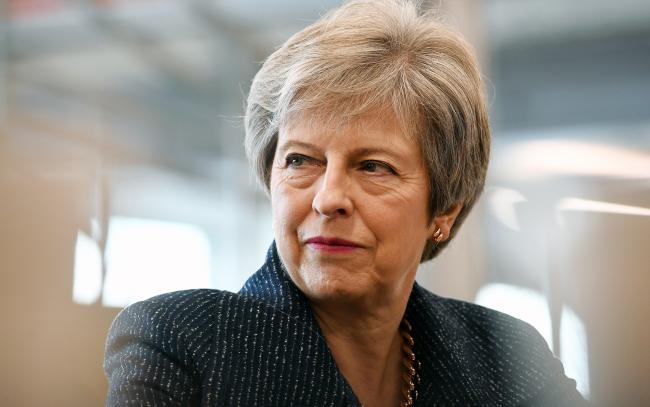 © Bloomberg. Theresa May, U.K. prime minister, pauses during a round-table discussion on the Race at Work charter in London, U.K.
© Bloomberg. Theresa May, U.K. prime minister, pauses during a round-table discussion on the Race at Work charter in London, U.K.(Bloomberg) — Theresa May suffered what she was told would be the first in a long line of defeats at the hands of opponents of a “no-deal” Brexit.
On Tuesday, the House of Commons voted 303 to 296 to restrict the U.K. prime minister’s tax-varying powers if Britain crashes out of the European Union without an agreement.
May’s officials were privately dismissive of the importance of the tax measure itself, but it will be harder to brush aside the rebellion of 20 Conservatives — including six former cabinet ministers — who voted against their own government.
Next week, May’s Brexit blueprint faces its toughest test. She appears to be on course to lose the crucial Jan. 15 vote in Parliament on whether to accept the divorce deal she’s negotiated with the EU. If Parliament rejects her plan, May says the U.K. will be in “uncharted territory” and could fall out of the EU in March with no trade deal in place.
British authorities estimate such a no-deal Brexit would crash the pound by as much as 25 percent, and hit house prices by as much as 30 percent, risking a recession. Tuesday’s vote suggests British politicians may be ready to act to stop that happening.
Show of Strength
“This vote shows the strength of concern across the House of Commons about the dangers no-deal could pose to manufacturing industry, jobs, food prices, policing and security,” said Yvette Cooper, the Labour Party representative who led the successful move against May’s finance bill. “Whilst there are still a wide range of different views on the best way forward, it shows that enough members of Parliament are ready to come together in a sensible way to oppose a chaotic no-deal.”
Until now, May’s main worry has been keeping the pro-Brexit euroskeptics in her Tory party on side. Tuesday’s defeat shows that a growing number of politicians on the pro-EU wing of her party have lost patience with May’s threat of a no-deal Brexit.
Oliver Letwin, who has almost never rebelled before, warned that he would “continue to do so right up to the end of March,” trying to make it more difficult for the government to implement no-deal provisions. “We will not allow a no-deal exit,” he told the chamber.
No Brexit?
Brexit-supporters in the Conservative ranks have so far felt comfortable about voting against the Withdrawal Agreement that May has negotiated, saying that they’re happy with the idea of leaving the EU without a deal at all.
It’s possible that Tuesday’s vote will make some hardline Brexit backers wonder if they need to start taking seriously May’s warning that they risk getting no Brexit at all if they vote down her deal next week.
At a meeting of May’s cabinet on Tuesday morning, ministers discussed contingency planning for a no-deal exit. But the mood inside the room was that this would be a very bad outcome, according to people familiar with the meeting.
Pensions Secretary Amber Rudd is said to have told her colleagues that history would take a dim view of a cabinet that pushed Britain out of the EU with no agreement. Rudd also said ministers should reach across the House of Commons to find a position for which there was a majority — effectively arguing that May should try to win the support of politicians in other parties who want a softer Brexit.
Environment Secretary Michael Gove provided the most memorable image of the discussion. According to one person present, he compared those who are hoping for a better deal to middle-aged men holding out for movie star Scarlett Johansson. Justice Secretary David Gauke responded that perhaps the actor would be riding a unicorn — a reference to the idea that Brexit hardliners are chasing fantasies.
Crunch Time
May has set the date for the vote on her deal — postponed from last year — for Jan. 15. If she hoped that the Christmas break would lead to feelings of goodwill within Parliament, she’s likely to have been disappointed.
Not only are Brexit-backing Tories still saying they’ll vote against, but the prime minister made little headway at a cross-party meeting of more than 200 members who oppose a no-deal departure on Tuesday evening.
“It’s all too little, too late,” Labour’s Ben Bradshaw told reporters outside the meeting. “If she wanted to build a consensus, she should have started two-and-a-half years ago.”
Source: Investing.com



























